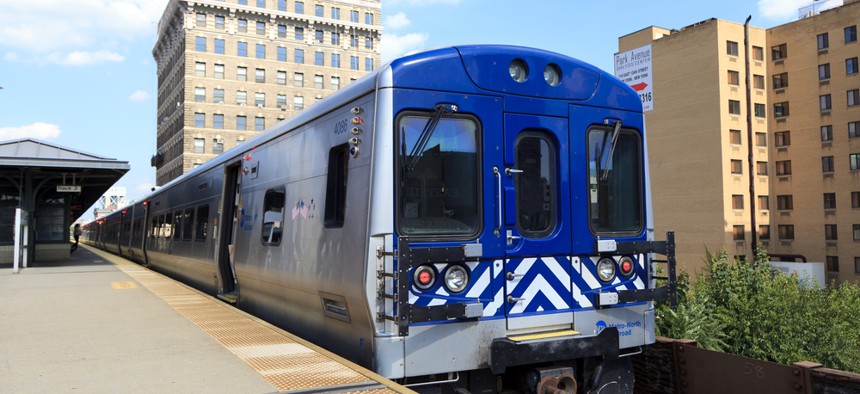Nonprofits battle a new tax affecting nonprofit commuters

A Metro North commuter train Shutterstock
The Nonprofit Coordinating Committee of New York is urging action on an outstanding bill that would prevent a tax on commuter benefits. Changes to the federal tax code left nonprofits vulnerable to the Unrelated Business Income Tax, but the state Legislature passed a fix that awaits the governor’s signature. The NCCNY is urging nonprofits to call or email the governor to catalyze action on the matter.
“To levy a tax on commuter benefits given to employees, who are carrying out the organization’s mission every day, is unprecedented,” nonprofit advocates Allison Sesso, Doug Sauer and Sharon Stapel wrote in a September op-ed in the New York Daily News. “For-profit businesses only pay taxes if they are profitable, and are not subject to a specific commuter tax, while cash-strapped nonprofits are forced to pay this tax even if they operate at a loss. In New York alone, this provision would force nonprofits to pay up to $364 million extra on commuter benefits.”
New York state has committed $5.5 million in new funding for nonprofits that help at-risk youth. The money will come from the Office of Children and Family Services and aims to fund educational programming, job training, employment services and leadership development, according to a Nov. 26 press release from the Governor’s Office. A total of $1 million will be earmarked for Long Island, with the rest going to programs across the state, with recipients to be announced in January. Read more here.
The New York City Council held a hearing on Nov. 27 about child removals. Among the issues that were discussed at the hearing was this report from the Center for New York City Affairs, which found that emergency removals and other actions by the Administration for Children's Services have increased in recent years. A video stream of the hearing is available here.
Our Emma Ketteringham is testifying before @NYCCouncil on Family Separation in NYC. Since 2007, we have represented more than 11,000 parents in the Bronx and helped thousands of children either safely remain at home or safely reunite with their families. https://t.co/wjSAlV9ojn
— The Bronx Defenders (@BronxDefenders) November 27, 2018
For unstated reasons a meeting of the Mayor's Fund to Advance New York City was not open to the public. The Mayor’s Fund came under criticism earlier this year because of chair Chirlane McCray’s lack of attendance in some board meetings. Efforts to display a more transparent side of the city-affiliated nonprofit however have been mixed as of late, according to the Daily News City Hall bureau chief.
.@NYCMayor and @NYCFirstLady will speak today at a meeting of the Mayor's Fund to Advance New York City's Advisory Board, which is made up of very rich people. This meeting is closed press, for a reason not articulated in either the mayor's public schedule or McCray's.
— Jillian Jorgensen (@Jill_Jorgensen) November 27, 2018
Birch Family Services has received a $165,000 contract from the New York City Department of Health and Mental Hygiene. The money will fund “mental retardation services for children and adolescents,” according to the City Record. Two other nonprofits also got new contracts to provide mental health services for adults on behalf of the department: Riverdale Senior Services ($122,000), and the Institute for Community Living ($256,103).
The Department for the Aging is in the midst of a contract blitz, with eight new contracts for senior services receiving approval. They are: Bay Ridge Center ($125,000), Jewish Community Center of Staten Island ($117,284), Brooklyn Chinese American Association ($132,500), Shorefront Jewish Community Council ($273,886), Shorefront YM-YWHA of Brighton Manhattan Beach ($245,095), Hamilton Madison House ($117,284), India Home ($316,500) and Vera Institute of Justice ($101,500).
A public hearing will consider eight contracts for scatter site housing and case management for substance abuse. The hearing will take place at 10 a.m. on the 37th floor of 150 Greenwich Street in Manhattan. The hearing will concern a prospective contract with Visiting Nurse Service of New York to provide $1.2 million in services for substance abuse clients in Manhattan, Queens and Staten Island. Also under consideration are seven prospective contracts between the Human Resources Administration and the following organizations to provide scatter site housing and supportive services to people living with AIDS: Camba ($1,422,380), AIDS Center of Queens ($830,818), Bridging Access to Care ($1,376,427), Harlem United Community ($1,315,114), Institute for Community Living ($845,848 and $1,379,016), and University Consultation and Treatment Center for Mental Hygiene ($1,133,170)